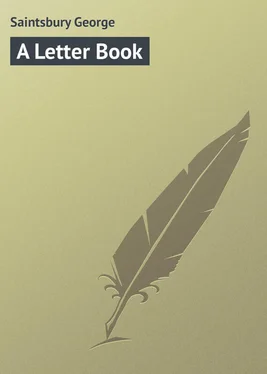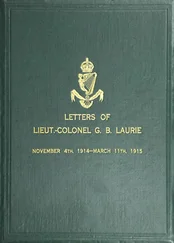George Saintsbury - A Letter Book
Здесь есть возможность читать онлайн «George Saintsbury - A Letter Book» — ознакомительный отрывок электронной книги совершенно бесплатно, а после прочтения отрывка купить полную версию. В некоторых случаях можно слушать аудио, скачать через торрент в формате fb2 и присутствует краткое содержание. ISBN: , Жанр: foreign_language, foreign_prose, на английском языке. Описание произведения, (предисловие) а так же отзывы посетителей доступны на портале библиотеки ЛибКат.
- Название:A Letter Book
- Автор:
- Жанр:
- Год:неизвестен
- ISBN:http://www.gutenberg.org/ebooks/31072
- Рейтинг книги:3 / 5. Голосов: 1
-
Избранное:Добавить в избранное
- Отзывы:
-
Ваша оценка:
- 60
- 1
- 2
- 3
- 4
- 5
A Letter Book: краткое содержание, описание и аннотация
Предлагаем к чтению аннотацию, описание, краткое содержание или предисловие (зависит от того, что написал сам автор книги «A Letter Book»). Если вы не нашли необходимую информацию о книге — напишите в комментариях, мы постараемся отыскать её.
A Letter Book — читать онлайн ознакомительный отрывок
Ниже представлен текст книги, разбитый по страницам. Система сохранения места последней прочитанной страницы, позволяет с удобством читать онлайн бесплатно книгу «A Letter Book», без необходимости каждый раз заново искать на чём Вы остановились. Поставьте закладку, и сможете в любой момент перейти на страницу, на которой закончили чтение.
Интервал:
Закладка:
Women write the best letters, and get the best letters written to them: but it is doubtful whether Greek women, save persons of a certain class and other exceptions in different ways like Sappho and Diotima, 5 5 Genuine letters of Sappho would have been of the first interest to compare with those of Heloise, and the "Portuguese Nun" and Mademoiselle de Lespinasse. Diotima's might have been as disappointing as George Eliot's: but by no means must necessarily have been so. Aspasia's, sometimes counterfeited, ought to have been good.
ever wrote at all. The Romans, after their early period, were not merely a larger and ever larger community full of the most various business, and constantly extending their presence and their sway; but, by their unique faculty of organisation, they put every part of their huge world in communication with every other part. Here also we lack women's letters; but we are, as above remarked, by no means badly off for those of men. There have even been some audacious heretics who have preferred Cicero's letters to his speeches and treatises; Seneca, the least attractive of those before mentioned, put well what the poet Wordsworth called in his own poems "extremely va loo able thoughts"; one of the keenest of mathematicians and best of academic and general business men known to the present writer, the late Professor Chrystal of Edinburgh, made a special favourite of Pliny; and if people can find nothing worse to say against Sidonius than that he wrote in contemporary, and not in what was for his time archaic, Latin, his case will not look bad in the eyes of sensible men.
Sidonius, like Synesius, was a Christian, and, though the observation may seem no more logical than Fluellen's about Macedon and Monmouth, besides being in more doubtful taste, there would seem to be some connection between the spread of Christianity and that of letter-writing. At any rate they synchronise, despite or perhaps because of the deficiency of formal literature during the "Dark" Ages. It is not really futile to point out that a very large part of the New Testament consists of "Epistles," and that by no means the whole of these epistles is occupied by doctrinal or hortatory matter. Even that which is so, often if not always, partakes of the character of a "live" letter to an extent which makes the so-called letters of the Greek Rhetoricians mere school exercises. And St. Paul's allusions to his journeys, his salutations, his acknowledgment of presents, his reference to the cloak and the books with its anxious "but especially the parchments," and his excellent advice to Timothy about beverages, are all the purest and most genuine matter for mail-bags. So is St. Peter's very gentleman-like (as it has been termed) retort to his brother Apostle; and so are both the Second and the Third of St. John. Indeed it is not fanciful to suggest that the account of the voyage which finishes the "Acts," and other parts of that very delightful book, are narratives much more of the kind one finds in letters than of the formally historical sort.
However this may be, it is worth pointing out that the distrust of other pagan kinds of literature which the Fathers manifested so strongly, and which was inherited from them by the clergy of the "Dark," and to some extent the Middle Ages, clearly could not extend to the practice of the Apostles. If from the Dark Ages themselves we have not very many, it must be remembered that from them we have little literature at all: while from the close of that period and the beginning of the next we have one of the most famous of all correspondences, the Letters of Abelard and Heloise. Of the intrinsic merit of these long-and far-famed compositions, as displaying character, there have been different opinions – one of the most damaging attacks on them may be found in Barbey d'Aurevilly's already mentioned book. But their influence has been lasting and enormous: and even if it were to turn out that they are forgeries, they are certainly early forgeries, and the person who forged them knew extremely well what he was about. There is no room here to survey, even in selection, the letter-crop of the Middle Ages; and from henceforward we must speak mainly, if not wholly (for some glances abroad may be permitted), of English letters. 6 6 It is part of the plan to give, as a sort of Appendix to the Introduction, and extension of it towards the main body of text, some specimens of Greek, Roman (classical and post-classical) and Early Mediaeval letter-writing, translated for the purpose by the present writer. The continuity of literary history is a thing which deserves to be attended to, especially when there is an ever-growing tendency to confine attention to things modern – albeit so soon to be antiquated! I owe the last of these specimens, in the Latin from which I translate it, to the kindness of my friend the Rev. W. Hunt, D.Litt., to whom I had recourse as not myself having access to a large library at the moment, and who has assisted me in other parts of this book.
But the ever-increasing bonds of union – even of such union in disunion as war – between different European nations, and the developments of more complex civilisation, of more general education and the like – all tended and wrought in the same direction.
II
LETTERS IN ENGLISH – BEFORE 1700
Exceptions have sometimes been taken to the earliest collection of genuine private letters, not official communications written in or inspired by Latin – which we possess in English. "The Paston Letters" have been, from opposite sides, accused of want of literary form and of not giving us interesting enough details in substance. The objections in either case 7 7 Yet others, as to authenticity, have, I believe, been rejected by all competent scholarship.
are untenable, and in both rather silly. In the first place "literary form" in the fifteenth century was exceedingly likely to be bad literary form, and we are much better off without it. Unless Sir Thomas Malory had happened to be chaplain at Oxnead, or Sir John Fortescue had occupied there something like the position of Mr. Tulkinghorn in Bleak House , we should not have got much "literature" from any known prose-writer of the period. Nor was it wanted. As for interestingness of matter, the people who expect newspaper-correspondent fine writing about the Wars of the Roses may be disappointed; but some of us who have had experience of that dialect from the Russells of the Crimea through the Forbeses of 1870 to the chroniclers of Armageddon the other day will probably not be very unhappy. The Paston Letters are simply genuine family correspondence – of a genuineness all the more certain because of their commonplaceness. It is impossible to conceive anything further from the initial type of the Greek rhetorical "letter" of which we have just been saying something. They are not, to any but an excessively "high-browed" and high-flying person, uninteresting: but the chief point about them is their solidity and their satisfaction, in their own straightforward unvarnished way, of the test we started with. When Margaret Paston and the rest write, it is because they have something to say to somebody who cannot be actually spoken to. And that something is said.
The next body of letters – Ascham's – which seems to call for notice here is of the next century. It has not a few points of appeal, more than one of which concern us very nearly. Most of the writers of the Paston Letters were, though in some cases of good rank and fairly educated, persons entirely unacademic in character, and their society was that of the last trouble and convulsion through which the Early Middle Ages struggled into the Renaissance, so long delayed with us. Ascham was one of our chief representatives of the Renaissance itself – that is to say, of a type at once scholarly and man-of-the-worldly, a courtier and a diplomatist as well as a "don" and a man of letters; a sportsman as well as a schoolmaster. And while from all these points of view his letters have interest, there is one thing about them which is perhaps more interesting to us than any other: and that is the fact that while he begins to write in Latin – the all but mother-tongue of all scholars of the time, and the universal language of the educated, even when not definitely scholarly, throughout Europe – he exchanges this for English latterly, in the same spirit which prompted his famous expression of reasons for writing the Toxophilus in our own and his own tongue. There is indeed a double attraction, which has not been always or often noticed, in this change of practice. Everybody has seen how important it is, not merely as resisting the general delusion of contemporary scholars that the vernaculars were things unsafe, "like to play the bankrupt with books," but as protesting by anticipation against the continuance of this error which affected Bacon and Hobbes, and was not entirely without hold even on such a magician in English as Browne. But perhaps everybody has not seen how by implication it acknowledges the peculiar character of the genuine letter – that, though it may be a work of art, it should not be one of artifice – that it is a matter of "business or bosoms," not of study or display.
Читать дальшеИнтервал:
Закладка:
Похожие книги на «A Letter Book»
Представляем Вашему вниманию похожие книги на «A Letter Book» списком для выбора. Мы отобрали схожую по названию и смыслу литературу в надежде предоставить читателям больше вариантов отыскать новые, интересные, ещё непрочитанные произведения.
Обсуждение, отзывы о книге «A Letter Book» и просто собственные мнения читателей. Оставьте ваши комментарии, напишите, что Вы думаете о произведении, его смысле или главных героях. Укажите что конкретно понравилось, а что нет, и почему Вы так считаете.












